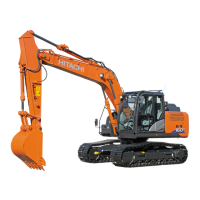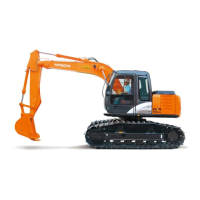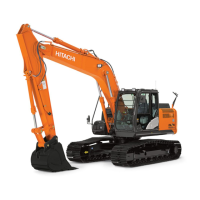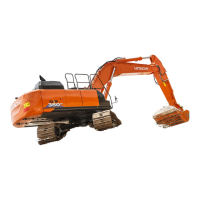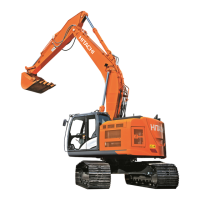Do you have a question about the Hitachi ZAXIS 160LC-3 and is the answer not in the manual?
Details the manual's purpose, structure, additional resources, and page numbering.
Explains safety alert symbols, signal words, and unit conversions used in the manual.
Presents and explains the visual safety alert symbols used in the manual and on the machine.
Defines signal words like DANGER, WARNING, CAUTION, IMPORTANT, and NOTE and their associated hazard levels.
Emphasizes reading and following all safety signs and messages, proper maintenance, and authorized operation.
Guidance on preparing for emergencies like fires and accidents, including first aid and fire extinguishers.
Lists necessary personal protective equipment (PPE) and advises against loose clothing or distractions.
Advises wearing hearing protection to prevent hearing impairment from prolonged exposure to loud noise.
Stresses the importance of daily walk-around inspections to avoid personal injury.
Provides precautions for cab safety, such as keeping it clean, storing items properly, and avoiding distractions.
Details safe practices for mounting and dismounting the machine using handholds and steps.
Explains how to properly adjust the operator's seat for comfort, control access, and visibility.
Instructs on securing the machine (lowering attachment, locking controls) before leaving the operator's seat.
Highlights the critical importance of wearing a seat belt to prevent injury or death during rollovers.
Advises on safely moving and operating the machine, including awareness of bystanders and using signal persons.
Provides safety precautions for handling and using starting fluid due to its flammability.
Mandates operating the machine only from the seated operator's position to prevent runaway incidents.
Details critical safety procedures for jump-starting the engine to prevent battery explosions and machine runaway.
Warns against allowing riders on the machine due to injury risks and obstructed visibility.
Outlines precautions before and during operations, including site investigation, PPE, and clearing the area.
Emphasizes thorough job site investigation, work planning, and ground condition assessment to prevent tipping and collapses.
Recommends equipping the machine with head guards, ROPS, or FOPS in areas with falling object risks.
Stresses the need for clear, coordinated signals and a signal person for jobs involving multiple machines.
Advises confirming the machine's direction of travel relative to controls to prevent incorrect operation and injury.
Provides guidelines for driving safely, including avoiding obstructions, slopes, and using seat belts.
Instructs on proper parking procedures to prevent machine rollaways and resulting serious injuries.
Advises keeping people clear of the working area and setting up barriers to prevent injury from swinging parts.
Prohibits positioning the bucket over people or truck cabs to avoid serious injury from load spills or collisions.
Provides guidance on positioning the machine to retreat from excavations and avoid collapses.
Details measures to prevent machine tipping, especially on grades, including proper speed and direction control.
Warns against undercutting high banks due to the risk of collapse, serious injury, or death.
Instructs on safe digging practices, including checking for underground utilities and avoiding fiber optic cables.
Advises caution when operating near overhead obstacles like bridges to prevent damage and injury.
Stresses the importance of maintaining a safe distance from electric lines to prevent electrocution.
Provides guidance on actions to take during an electrical storm, including stopping operation and evacuating.
Details safe practices for lifting and moving objects, including using proper equipment and avoiding people.
Advises wearing eye protection and keeping bystanders clear when striking objects to prevent injury from flying debris.
Outlines the correct procedure for safely parking the machine, including securing it and turning off the engine.
Provides safety guidelines for handling flammable fluids like fuel and lubricants to prevent fires and explosions.
Details the safety precautions required when loading, unloading, and transporting the machine.
Outlines critical safety steps and precautions to be followed before and during machine maintenance.
Emphasizes warning others and using tags during service work to prevent accidental operation.
Emphasizes securely supporting the machine or attachments when working on them to prevent collapse.
Warns against entanglement in moving parts and advises keeping hands, feet, and clothing clear.
Details precautions related to high-pressure systems like track adjusters and travel reduction gears to prevent flying parts.
Provides guidance on securely storing attachments like buckets and blades to prevent them from falling and causing injury.
Advises on preventing burns from hot fluids and the importance of periodic rubber hose replacement.
Highlights the importance of periodically replacing rubber hoses to prevent failures that could cause fires or fluid injection.
Warns about the dangers of high-pressure fluids penetrating skin or eyes and precautions for handling them.
Outlines measures to prevent fires related to oil leaks, electrical issues, flammable materials, and key switch checks.
Provides instructions for safely evacuating the machine in the event of a fire.
Warns about the dangers of exhaust fumes and advises on ensuring adequate ventilation when operating indoors.
Outlines safety precautions for welding and grinding, including ventilation, flammable object storage, and qualified personnel.
Warns against heating near pressurized fluid lines or flammable materials to prevent flammable spray or line rupture.
Prohibits welding or cutting lines with flammable fluids and advises thorough cleaning beforehand.
Advises on removing paint before welding or heating due to hazardous fumes, and proper disposal of materials.
Warns about the risks of inhaling asbestos dust and provides precautions for working in asbestos-containing environments.
Details safety measures to prevent battery explosions, including avoiding sparks, proper charging, and terminal security.
Provides safety guidelines for servicing the air conditioning system, including handling refrigerants and preventing skin contact.
Advises on safely handling hazardous chemicals used with the machine by consulting MSDS for details.
Explains the environmental importance of properly disposing of waste materials like oils, fuels, and filters.
Lists essential checks to perform after maintenance or repair before returning the machine to the customer.
| Brand | Hitachi |
|---|---|
| Model | ZAXIS 160LC-3 |
| Category | Excavators |
| Language | English |
